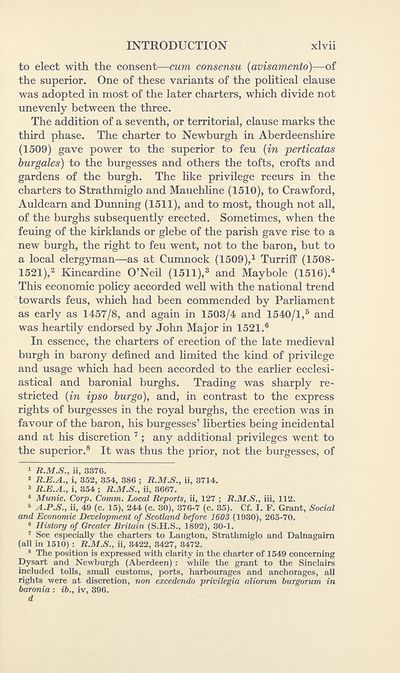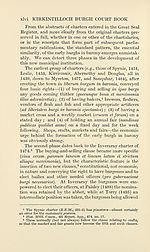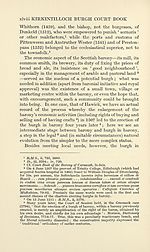Series 3 > Court book of the Burgh of Kirkintilloch 1658-1694
(54) Page xlvii
Download files
Complete book:
Individual page:
Thumbnail gallery: Grid view | List view

INTRODUCTION
xlvii
to elect with the consent—cum consensu (avisamento)—of
the superior. One of these variants of the political clause
was adopted in most of the later charters, which divide not
unevenly between the three.
The addition of a seventh, or territorial, clause marks the
third phase. The charter to Newburgh in Aberdeenshire
(1509) gave power to the superior to feu (in perticatas
burgales) to the burgesses and others the tofts, crofts and
gardens of the burgh. The like privilege recurs in the
charters to Strathmiglo and Mauchline (1510), to Crawford,
Auldearn and Dunning (1511), and to most, though not all,
of the burghs subsequently erected. Sometimes, when the
feuing of the kirklands or glebe of the parish gave rise to a
new burgh, the right to feu went, not to the baron, but to
a local clergyman—as at Cumnock (1509),1 Turriff (1508-
1521),2 Kincardine O’Neil (1511),3 and Maybole (1516).4
This economic policy accorded well with the national trend
towards feus, which had been commended by Parliament
as early as 1457/8, and again in 1503/4 and 1540/1,5 and
was heartily endorsed by John Major in 1521.®
In essence, the charters of erection of the late medieval
burgh in barony defined and limited the kind of privilege
and usage which had been accorded to the earlier ecclesi¬
astical and baronial burghs. Trading was sharply re¬
stricted (in ipso burgo), and, in contrast to the express
rights of burgesses in the royal burghs, the erection was in
favour of the baron, his burgesses’ liberties being incidental
and at his discretion 7; any additional privileges went to
the superior.8 It was thus the prior, not the burgesses, of
1 R.M.S., ii, 3376.
2 R.E.A., i, 352, 354, 386 ; R.M.S., ii, 3714.
3 R.E.A., i, 354 ; R.M.S., ii, 3667.
4 Mimic. Corp. Comm. Local Reports, ii, 127 ; R.M.S., iii, 112.
6 A.P.S., ii, 49 (c. 15), 244 (c. 30), 376-7 (c. 35). Cf. I. F. Grant, Social
and Economic Development of Scotland before 1603 (1930), 265-70.
6 History of Greater Britain (S.H.S., 1892), 30-1.
7 See especially the charters to Langton, Strathmiglo and Dalnagairn
(all in 1510) : R.M.S., ii, 3422, 3427, 3472.
8 The position is expressed with clarity in the charter of 1549 concerning
Dysart and Newburgh (Aberdeen) : while the grant to the Sinclairs
included tolls, small customs, ports, harbourages and anchorages, all
rights were at discretion, non excedendo privilegia aliorum burgorum in
baronia : ib., iv, 396.
d
xlvii
to elect with the consent—cum consensu (avisamento)—of
the superior. One of these variants of the political clause
was adopted in most of the later charters, which divide not
unevenly between the three.
The addition of a seventh, or territorial, clause marks the
third phase. The charter to Newburgh in Aberdeenshire
(1509) gave power to the superior to feu (in perticatas
burgales) to the burgesses and others the tofts, crofts and
gardens of the burgh. The like privilege recurs in the
charters to Strathmiglo and Mauchline (1510), to Crawford,
Auldearn and Dunning (1511), and to most, though not all,
of the burghs subsequently erected. Sometimes, when the
feuing of the kirklands or glebe of the parish gave rise to a
new burgh, the right to feu went, not to the baron, but to
a local clergyman—as at Cumnock (1509),1 Turriff (1508-
1521),2 Kincardine O’Neil (1511),3 and Maybole (1516).4
This economic policy accorded well with the national trend
towards feus, which had been commended by Parliament
as early as 1457/8, and again in 1503/4 and 1540/1,5 and
was heartily endorsed by John Major in 1521.®
In essence, the charters of erection of the late medieval
burgh in barony defined and limited the kind of privilege
and usage which had been accorded to the earlier ecclesi¬
astical and baronial burghs. Trading was sharply re¬
stricted (in ipso burgo), and, in contrast to the express
rights of burgesses in the royal burghs, the erection was in
favour of the baron, his burgesses’ liberties being incidental
and at his discretion 7; any additional privileges went to
the superior.8 It was thus the prior, not the burgesses, of
1 R.M.S., ii, 3376.
2 R.E.A., i, 352, 354, 386 ; R.M.S., ii, 3714.
3 R.E.A., i, 354 ; R.M.S., ii, 3667.
4 Mimic. Corp. Comm. Local Reports, ii, 127 ; R.M.S., iii, 112.
6 A.P.S., ii, 49 (c. 15), 244 (c. 30), 376-7 (c. 35). Cf. I. F. Grant, Social
and Economic Development of Scotland before 1603 (1930), 265-70.
6 History of Greater Britain (S.H.S., 1892), 30-1.
7 See especially the charters to Langton, Strathmiglo and Dalnagairn
(all in 1510) : R.M.S., ii, 3422, 3427, 3472.
8 The position is expressed with clarity in the charter of 1549 concerning
Dysart and Newburgh (Aberdeen) : while the grant to the Sinclairs
included tolls, small customs, ports, harbourages and anchorages, all
rights were at discretion, non excedendo privilegia aliorum burgorum in
baronia : ib., iv, 396.
d
Set display mode to:
![]() Universal Viewer |
Universal Viewer | ![]() Mirador |
Large image | Transcription
Mirador |
Large image | Transcription
Images and transcriptions on this page, including medium image downloads, may be used under the Creative Commons Attribution 4.0 International Licence unless otherwise stated. ![]()
| Scottish History Society volumes > Series 3 > Court book of the Burgh of Kirkintilloch 1658-1694 > (54) Page xlvii |
|---|
| Permanent URL | https://digital.nls.uk/126713811 |
|---|
| Attribution and copyright: |
|
|---|
| Description | Over 180 volumes, published by the Scottish History Society, containing original sources on Scotland's history and people. With a wide range of subjects, the books collectively cover all periods from the 12th to 20th centuries, and reflect changing trends in Scottish history. Sources are accompanied by scholarly interpretation, references and bibliographies. Volumes are usually published annually, and more digitised volumes will be added as they become available. |
|---|


